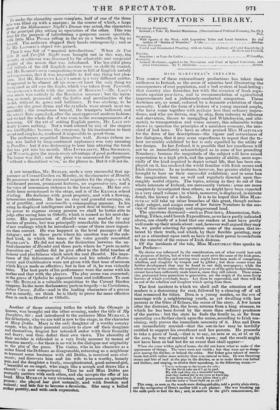A new tragedian, Mr. BUTLER, made a very successful first
ap- pearance at Covent Garden on Monday, in the character of Hamlet. He possesses most of the external requisites for the stage,—a tall, well-formed person, prominent features, an expressive eye, and a fine voice of uncommon richness in the lower tones. He has evi- dently been accustomed to the stage, and is of the KEMBLE school of acting. He declaims with great propriety, and with a flowing, harmonious cadence. He has an easy and graceful carriage, an air of gentility, and occasionally a commanding manner. In his acting gentility,
displayed intelligence and a good deal of feeling; nut of
his power to express strong passion we shall be better able to judge after seeing him in Othello, which is named as his next cha- racter. His personation of Hamlet was not marked by any touches of genius, but was principally remarkable for the number of new readings which he introduced—some of them more ingeni- ous than correct. He was happiest in the level passages of the dialogue and in -those parts where his emotion was of the sub- dued kind, in which the tones of his voice greatly resembled MACREADY'S. He did not mark the distinction between the na- tural character of Hamlet and those parts where he "puts an antic disposition on ;" neither did he give effect to the fitful touches of humour and playfulness which mark the real Hamlet. His impa- tience of the tediousness of Polonius and his rebuke of Rosen- cram: and Guildenstern were not given with that tone of sarcasm which KEAN made so effective; but in lieu of it, he was violently bitter. The best ,parts of his performance were the scene with his mother and that with the players. The play scene was overacted; at the grave of Ophelia he appeared tame and indifferent. To sum up—Mr. BUTLER is a valuable acquisition to the Covent Garden company. In the more declamatory parts in tragedy—in Coriolanus, Julius Ccesar, Rolla—and. in the leading characters of a graver cast in comedy, we think he is likely to prove far more effective than in such as Hamlet or Othello.



























 Previous page
Previous page